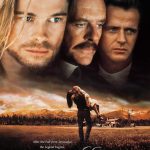Edward Scissorhands (1990)

In 1990, director Tim Burton introduced audiences to Edward Scissorhands, a magical blend of fairy tale and modern-day fable that has since become one of the most iconic films of its era. With its unique visual style, emotionally charged performances, and unforgettable storyline, the film is an enchanting exploration of themes like isolation, acceptance, and the nature of human kindness.
The Story
At its heart, Edward Scissorhands tells the story of Edward (played by Johnny Depp), a gentle yet incomplete being created by an eccentric inventor (played by Vincent Price). Edward is left unfinished when his creator dies, leaving him with scissors instead of hands. Alone and isolated, Edward lives in a dilapidated mansion until he is discovered by Peg Boggs (Dianne Wiest), a kindly Avon saleswoman who brings him into her suburban home.
Edward’s presence in the neighborhood stirs curiosity and eventually admiration, thanks to his unique talent for sculpting hedges and hairstyling with his scissor hands. However, as the novelty wears off, fear and suspicion begin to creep into the community, revealing the darker side of human nature. The film’s emotional core lies in Edward’s relationship with Peg’s daughter, Kim (Winona Ryder), whose compassion for Edward evolves into a poignant love story.

A Unique Visual and Emotional Style
Tim Burton’s distinctive visual style is immediately apparent in Edward Scissorhands, combining whimsical set designs with gothic undertones. The contrast between Edward’s gothic, dark appearance and the bright, pastel-colored suburban world creates a visual metaphor for his inability to fit in. The film’s aesthetic is a delicate balance between fantasy and reality, perfectly capturing the surreal nature of the story.
Composer Danny Elfman’s hauntingly beautiful score further enhances the film’s mood, imbuing the narrative with a sense of melancholy and wonder. The music, much like the film itself, has since become iconic, adding to the dreamlike atmosphere that defines Burton’s work.
Johnny Depp’s Breakthrough Performance
For Johnny Depp, Edward Scissorhands marked a turning point in his career. His portrayal of Edward is both delicate and powerful, conveying deep emotions despite the character’s limited ability to communicate verbally. Depp’s Edward is a character of profound innocence and vulnerability, who seeks connection but is often met with misunderstanding and rejection. It’s a role that has become synonymous with Depp’s early career and remains one of his most beloved performances.
Themes of Isolation and Acceptance
At its core, Edward Scissorhands is a story about being different and the pain that often accompanies not fitting into society’s mold. Edward’s scissor hands are a literal and symbolic representation of the barriers that prevent him from truly connecting with others. His journey from acceptance to rejection mirrors the real-world experiences of those who feel marginalized because of their differences.
The film also explores the themes of compassion and cruelty. The suburban community initially welcomes Edward for his talents, but when faced with his differences, they quickly turn on him. This shift reflects society’s tendency to fear and ostracize those who do not conform to its norms, a message that continues to resonate decades after the film’s release.
A Legacy That Endures
Edward Scissorhands remains one of Tim Burton’s most celebrated films and has earned a place in cinematic history as a modern classic. Its themes of love, loneliness, and acceptance continue to strike a chord with audiences, while its visual and emotional artistry set it apart as a masterpiece of storytelling.
The film’s unique blend of fantasy, romance, and gothic fairy tale has left an indelible mark on pop culture, influencing everything from fashion to fan art. More than three decades after its release, Edward Scissorhands continues to inspire new generations with its timeless message about the power of kindness and the beauty of being different.
Suggested videos for you:











